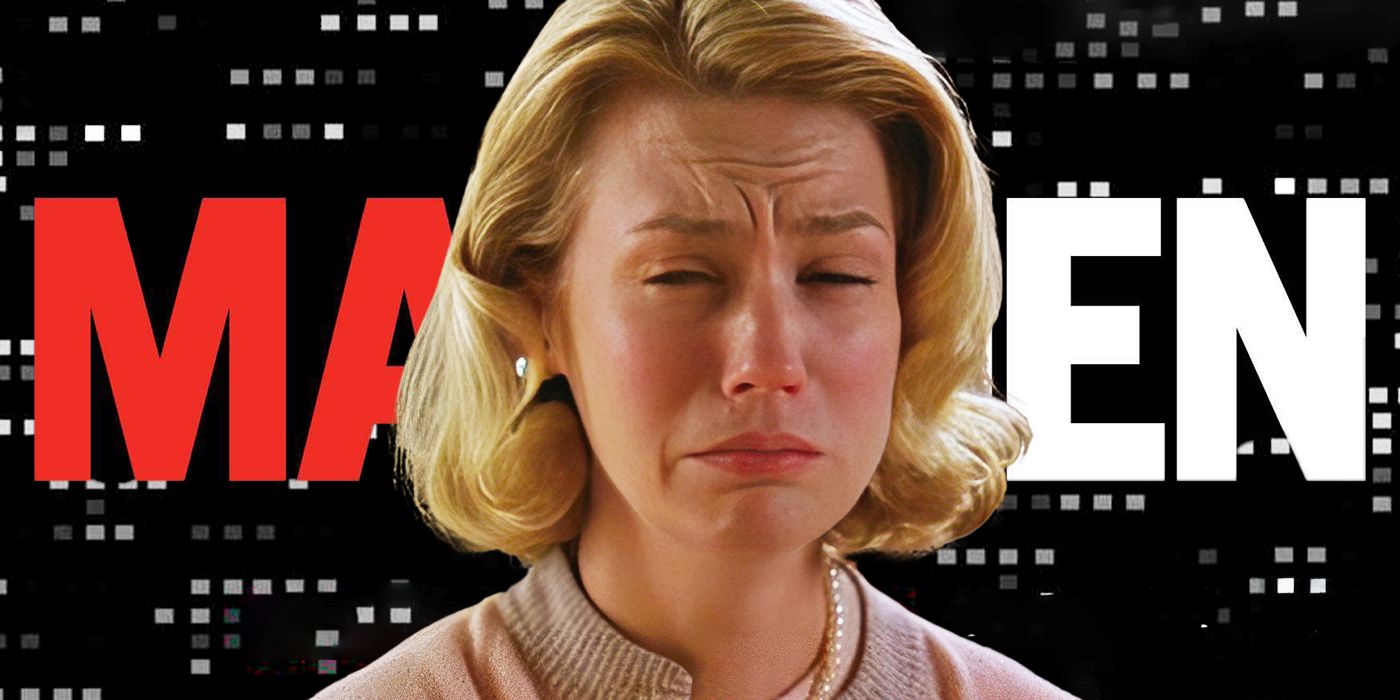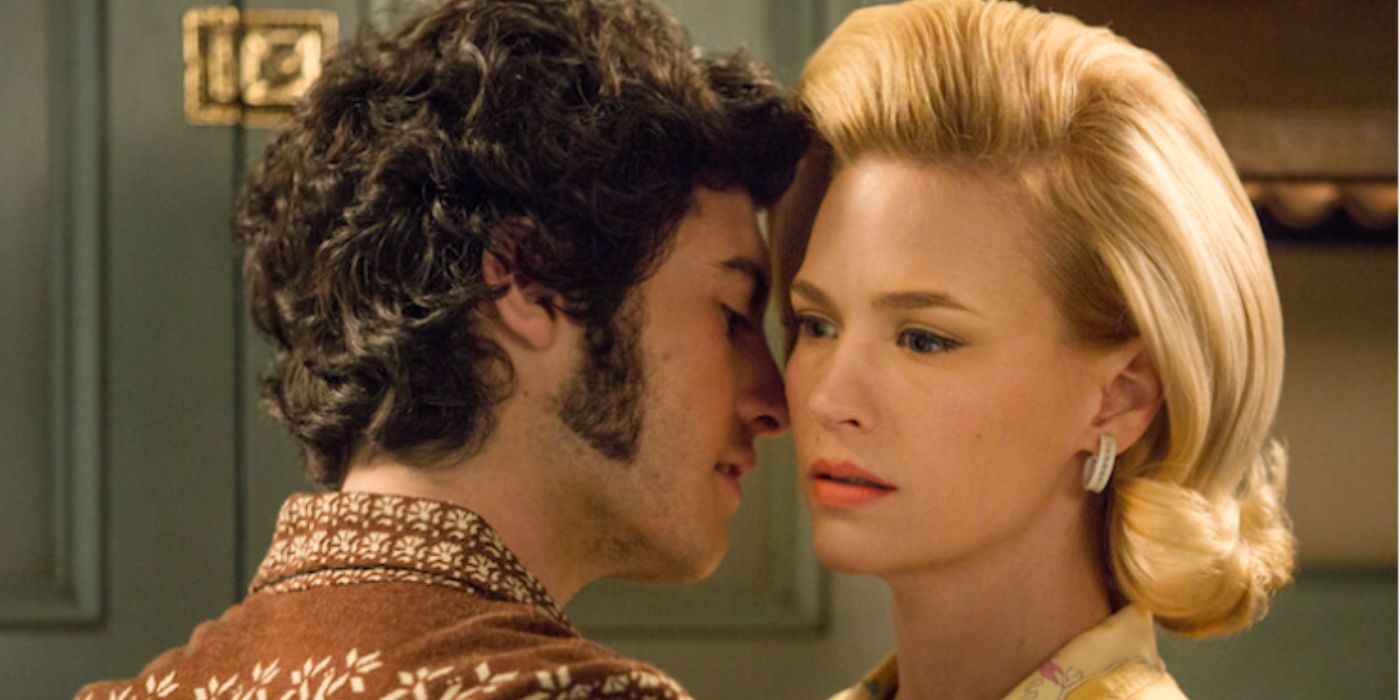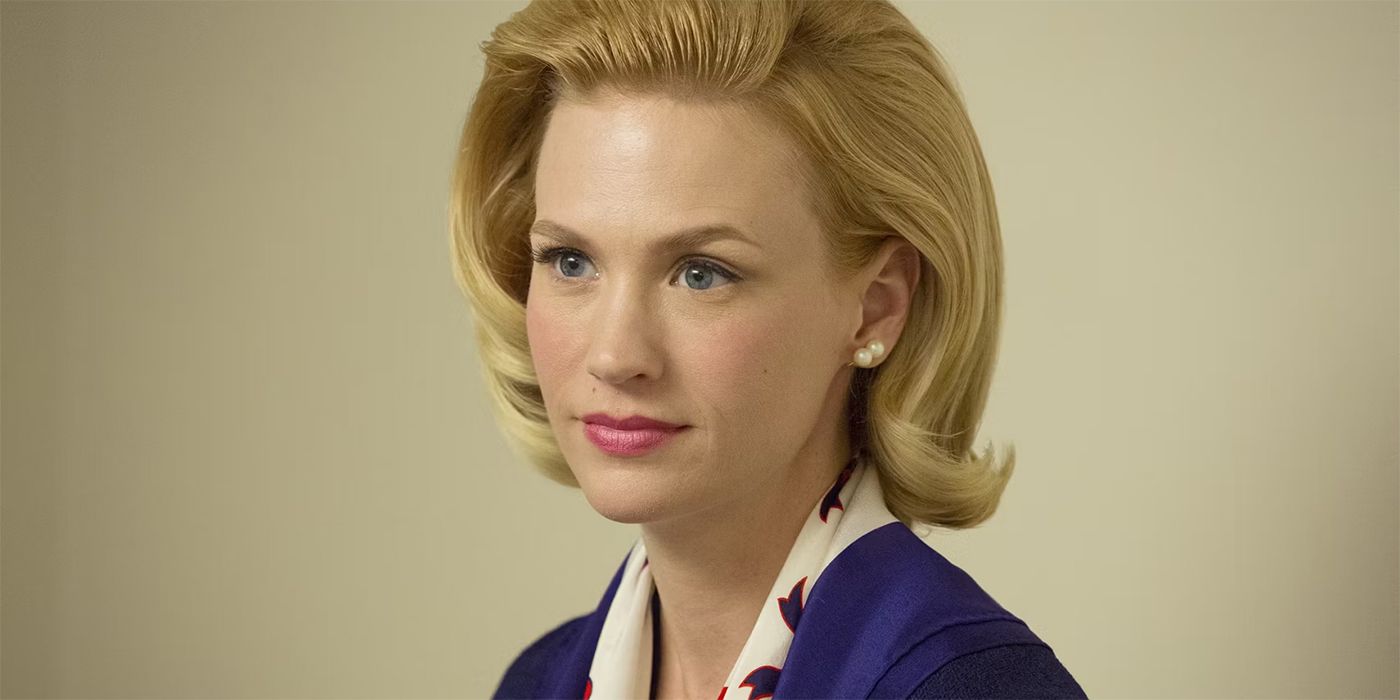The Big Picture
- Betty Draper was unfairly painted as a villain in Mad Men, but was actually a victim of Don Draper.
- The series failed to fully explore Betty's character and never separated her from the men in her life.
- January Jones gave an underrated performance, highlighting missed opportunities to portray the struggles of women in the 60s.
She was ice that was never allowed to thaw. Betty Draper was never given the courtesy to explore the depths of her emotions. She was painted as an unsympathetic villain, and the cruel, harsh wife of Mad Men’s antihero, Don Draper (Jon Hamm). Portrayed by January Jones, she is the unsung supertrooper of the AMC series and gives one of its most misunderstood, complex portrayals.
An adulterer, absent father, and criminal, Don Draper is the true villain in his marriage to Betty. Don was a complicated, tortured soul, and the series peels back his layers to find the real man at his core that he so desperately tries to hide. Peggy Olson (Elizabeth Moss), Joan Harris (Christina Hendricks), and Roger Sterling (John Slattery) are also given intricate characterizations that create complex studies of working men and women in the 60s. But, as a depressed housewife and struggling mother, Betty is never given that same grace by the series creator and writer, Matthew Weiner. It's Mad Men's biggest tragedy, and a missed opportunity to highlight one of the biggest revolutions of the 60s.

Mad Men
A drama about one of New York's most prestigious ad agencies at the beginning of the 1960s, focusing on one of the firm's most mysterious but extremely talented ad executives, Donald Draper.
- Release Date
- July 19, 2007
- Cast
- Jon Hamm , John Slattery , Elisabeth Moss , Vincent Kartheiser , January Jones , Christina Hendricks , Robert Morse , Aaron Staton
- Main Genre
- Drama
- Seasons
- 7
Betty Draper Is a Failed Realization of the Feminine Mystique
The 60s was a time for revolutions. The second wave of feminism, civil rights, environmental rights, LGBTQ rights, and free love all began during the decade, and changed America. One of the most groundbreaking novels at the time was The Feminine Mystique, written by Betty Friedan. A breakdown of the American housewife in the 50s and 60s explores how women are taught to suppress their own needs, all in the name of servicing their husbands and children. Friedan finally gave a name to that lonely, depressed feeling so many women had as they ironed their husband's suits and washed dishes alone in the kitchen.
Betty Draper shares many qualities with what The Feminine Mystique teaches its readers. She lives a quiet life of desperation in a household where her husband never truly sees her, nor does he try to. Jones is reserved and disquieting, and gives a standout performance of a woman fighting a silent war with depression. But Weiner never fully lets the character become realized as an oppressed homemaker. Instead, Betty is always defined by other characters, especially Don. Weiner doesn't separate Betty from the men in her life, or explore her complex identity on her own terms. She's often portrayed as jealous, whiny, and obsessed with getting Don's approval. It's a failed experiment of trying to depict the feminine mystique, and a disservice to Betty.
One of the first disservices to Betty, courtesy of the weak writing where her character was concerned, came in Season 1, Episode 13, "The Wheel", which is considered one of the series best episodes. It's the first time Betty acknowledges that she is aware Don is unfaithful during a therapy session. It's indicative that her depression and anxiety all comes from a man, instead of her own mental health issues or lack of purpose in the world. Weiner and his writers came close to turning the feminine mystique into a real tangible thing, but instead it remains just out of reach, like the feeling itself.
Betty's Relationship With Glen Bishop Just Doesn't Work
"The Wheel," is also the beginning of the strangest relationship on Mad Men, and though there were a lot of baffling relationships, this pairing takes the cake. Betty and her neighbor, the child Glen Bishop (Marten Holden Weiner), begin their weird, rocky road towards an inexplicable friendship, as the show gave her child-like attributes. Painted as an emotionally immature woman who never fully grew up, she only found true solace in another child, the boy who her daughter, Sally (Kiernan Shipka), is in love with.
Played by Weiner's son, Marten Weiner, Betty finds Glen sitting alone in his parents' car in a parking lot while his mother is running errands. Desperate for a connection, Betty confides to Glen of all people, about how distraught she is in her life, saying, "I'm so sad," then begins to cry. Glen reaches out to hold her hand, and responds by saying, "I wish I was older." The scene plays out strangely with clipped, non-descriptive dialogue before abruptly ending. It never gets deeper than Betty stating her sadness, and the series missed the opportunity to peel back her layers, instead continuously silencing her.
Deemed "Creepy Glen" by kids at school, Betty and Glen go on to have a hot and cold relationship that blossoms into something more sinister in the final season. As Glen prepares to ship off to Vietnam, Sally reacts angrily while Betty respects his bravery. Their odd love triangle shares similarities to the 1960s film, The Graduate. Though Betty isn't trying to seduce Glen with innuendos or glasses of whiskey, there is a resemblance to the film in Glen's love for Betty, while Sally loves Glen herself. Betty also never discourages Glen's flirtation, especially when he says goodbye and attempts to kiss her. The scene is uncomfortable to watch, and is a relationship that did not need to be in the show. As Mad Men progresses, it plays out like an immature male fantasy, and turns Betty into an object to be desired.
Betty Draper Was Unfairly Hated by Fans and Critics
Though Betty only reacted to Don's behaviors and affairs when she was forced to, she was unanimously disliked by many Mad Men fans, and even critics. The series gave her the worst storylines, like her relationship with Glen, and then in Season 5, having January Jones wear a fatsuit as Betty gains a substantial amount of weight. Betty was subject to countless humiliations in addition to Don's infidelity, which never moved any plot forward.
Betty was never the real bad guy, it was Don, and he wrecked havoc on her and her children's lives. Weiner never makes his mind up about Betty, and if she should be likable, or if she is a cold, unsympathetic mother. In reality, she was a woman struggling with anxiety and panic attacks in the wake of both of her parents passing, with an impending fear of death. But, the series makes her out to be the villain as a spoiled, mean wife tainting Don's life, while also painting her as a bad mother. To cap it off, her diagnosis of getting lung cancer in her 30s, and the coming of death not long after, is the saddest ending for any one character in the series finale.
January Jones Gives the Most Underrated Performance in Man Men
One of Mad Men's greatest qualities is the women who grace the screen. Elisabeth Moss as Peggy Olson gifted television with one of the greatest female characters of the 21st century. She, alongside Christina Hendricks, received praise for their subtle portrayals of working women in the male-dominated 60s work force, and their dealings with sexist harassment. But, while the series was triumphant in showing the second wave of feminism in the office, it never translated home to Betty, or recognition for Jones's talents.
Jones does an incredible job with the material she is given, and stays true to the icy persona Weiner wrote for her. Whether she’s shooting at birds in her front yard with a shotgun, making the perfect dinner for her husband, or calmly accepting the fact that she’s going to die, we never truly get to know Betty. Maybe that’s because she never let anyone truly know her, including her husband. But it’s the biggest opportunity missed by the show, as they had a chance to highlight the inner turmoil so many women went through during the 60s, but were suppressed into silence instead, just like Weiner did to his character, Betty Draper.
Mad Men is available to stream on AMC+ in the U.S.





